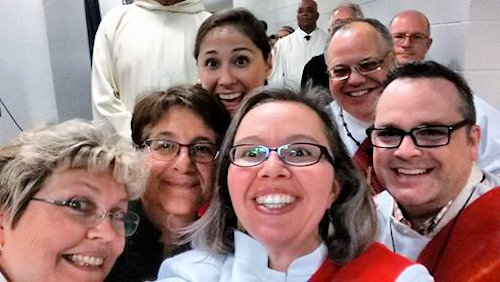Where would we be without first claiming who we are in God? I’m a beloved child of God, a God of radical grace and radical love. I vaguely felt a call to ministry starting in high school. In college, my campus ministry sent me to Exploration, a United Methodist event to help discern one’s calling. As I sat in different sessions learning about different ministry settings, several options interested me, but I declared to myself that I would never work as a hospital chaplain. Today, I work at the University of Michigan Health Systems… as a chaplain. I have found the hospital to be sacred ground where biology, spirituality, ethics, technology, and so many other fields intersect. It is an honor to walk patients, families, and staff as they navigate and make meaning out of the life-changing health issues that bring people to UMHS. I also am working on research related to diversity issues in health care and spiritual assessments.
Where do you come from?
I was raised in a small Midwestern town by a family that, among other things, prioritized service to others, participated in the UAW and the International Union of Operating Engineers, and talked politics with me while watching the evening news. I never would have thought of us as progressive, and we certainly never used the term “social justice.” We were simply a lower to middle class white family who cared for others, worked hard, and cared about what was going on in our local and broader communities. If there was someone in need, we provided help. If there was an important cause, we supported it. If there was a candidate we backed, we placed yard signs. It was only many years later that I realized that my work today had its early beginnings in my childhood and family. The causes may not be the same, but the care for each other and for creating a more just society are rooted deeply within me.
Why are you here?
I grew up United Methodist, baptized at three months old into the community at Marshall UMC, educated in Sunday School at Lyon Lake UMC, and later confirmed and nurtured again by Marshall UMC. My first night at college, knowing no one, I found my way to the United Methodist campus ministry, University Christian Ministry at Northwestern University. From there, I became active in the United Methodist Student Movement and learned about the worldwide church of which I was a part. My Methodist identity came naturally but without much real consideration. As I grew in my church involvement, however, I began to find things in my with which I deeply disagreed, namely our stance on sexual orientation, and I wondered if indeed this tradition was the best fit for me. And so I studied. I learned of our strong history of social justice- from child labor laws to voting rights, of Wesley’s concern for both personal and social holiness, and of the practical theology and emphasis on grace for which we are known. As I studied, two things happened. First, I realized many of our current positions did not seem to fit with our historical stances, and second, the roots of our tradition resonated deeply with that I was seeking in a religious community. So I decided to remain a United Methodist, but in doing so, to actively work to ensure we follow the tradition of our heritage- a church that welcomes all, always errors on the side of grace, and works tirelessly for the marginalized.
What are you most passionate about?
I am most passionate about working at the intersections of church and society. I have not felt called to full-time parish ministry but rather to the places where the church forgets to go or is not able to go. In these places, I have encountered people who have been harmed by religion, religious communities, and religious people. I hope to help them heal where possible and offer a liberating, grace-filled faith. For the last several years, this occurred in the classroom where I worked with undergraduates reconciling sexuality and spirituality. Now, it happens when I walk with patients, families, and staff through the most difficult health situations as they seek for a spirituality that gives them meaning. I love bringing God’s grace and love to these places.
~reprinted from the MFSA series, “Justice Seeking People of Faith: Getting to Know MFSA Through the People whose Passion Fuel our Movement”. Christiana is Co-President of the Board of Directors of the Methodist Federation for Social Action (MFSA).

